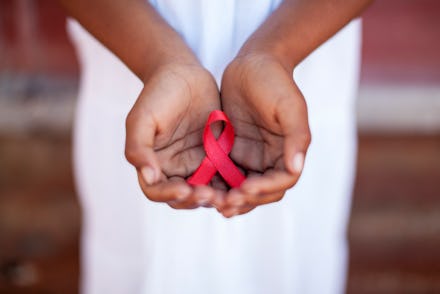Here's How to Respectfully Talk About HIV

Since July 3, 1981, when the New York Times published news of a "rare cancer seen in 41 homosexuals," the media has wrestled with the ever-changing landscape that is HIV treatment and prevention: its stories, its unique vocabulary and most of all its subjects. In 2015 as ever before, we have an obligation to write about HIV while affirming the dignity of those who live with it.
Today, actor Charlie Sheen disclosed on Today that he is HIV positive. Sheen is not the first celebrity to do so. There may be many more to come. And no matter who decides to come out as HIV positive, their stories should be told with respect.
Here is Mic's company style guide regarding HIV coverage. We decided to share it publicly because, basically, reporting on HIV is hard and we all could use some help. We believe it's a good example of person-first language and emphasis on personal dignity. These guidelines should ensure that our writing avoids stigmatizing people living with or affected by HIV. While those people may choose to self-identify with different terms, for editorial purposes Mic will adhere to the following.
HIV/AIDS
HIV is a virus, while AIDS is a diagnosis that some patients with HIV get after the virus has severely suppressed their immune system. People are "HIV positive" or "HIV negative" (in the compound modifier form, it is hyphenated: "HIV-positive person"), and they either have AIDS or they do not. Do not say "full-blown AIDS" or similar; a person either meets the criteria for an AIDS diagnosis or does not. All people with AIDS have HIV, but not everyone with HIV has or ever develops AIDS. (See the Centers for Disease Control and Prevention website for exact definitions of AIDS and other terms.)
Also check the CDC regularly for statistics on HIV-positive people in the United States. An estimated 1.2 million people are currently living with HIV in the U.S. The U.S. government estimates that 35 million people worldwide are living with HIV.
"Drug abuser" and "drug addict"
The terms "drug abuser" and "drug addict" are derogatory and stigmatizing. If relevant, use "injecting drug user," or if specifics are available, describe a person's use of a particular substance.
"HIV status" or "mixed-status relationship"
Terms like "serostatus," "seropositive" or "serodiscordant" (that is, a couple in which one member has HIV and the other does not), while correct, are overly medical for our purposes. Use "HIV status," "HIV positive" or "mixed-status" instead.
"HIV-positive person" or "HIV-positive people"
In order to emphasize person-first language, use "person living with HIV" or "people living with HIV" when referencing a person. If the person has disclosed his or her name, write "Smith is living with HIV" or "Smith is HIV positive."
"High-risk activity" or "high-risk group"
Avoid terms like "high-risk activity" or "high-risk group," as they often stigmatize certain populations. People are not risks. If a person is engaging in an activity this is a "known risk factor," describe it as such. Be as specific as possible for clarity: "Smith said he regularly injected heroin with unsterile needles and had sex without a condom, two behaviors known to be risk factors for HIV infection."
A person does not "die from AIDS"
Because AIDS is a syndrome and not a disease or virus, a person does not "die of/from AIDS." Instead, someone "dies from an AIDS-related illness" or "complications from AIDS." Again, be specific where possible: "She contracted pneumonia shortly after her AIDS diagnosis."
Antiretroviral therapy
People do not "treat AIDS." "Antiretroviral therapy," the use of one or several medications to keep HIV from replicating after infection, has been in use since the mid 1990s. There are currently more than 30 varieties of this medication, which aim to reduce the amount of HIV in one's blood — as a syndrome, or collection of symptoms, AIDS itself cannot be treated. Do not abbreviate antiretroviral therapy as "ARV" or "ART" on second reference; after first mention, you can refer to someone's "antiretroviral medications" or "antiretrovirals."
Sex work
"Sex worker" and "sex work" are the preferred terms. Also, "porn actor/ actress," not "porn star," are preferred terms.
"Unsafe sex"
In the age of post-exposure prophylaxis and pre-exposure prophylaxis, also known as "PEP" or "PrEP," protection from HIV does not always resemble a physical barrier. As such, avoid terms like "unsafe" or "unprotected" in discussions of sex. In writing about HIV, use the most specific term possible. "They had sex without a condom" is preferred to "They had unsafe sex." Conversely, "safe sex" is somewhat of a misnomer; be specific in describing activities: "They had sex with a condom, and the HIV-negative partner takes PrEP daily."
Some context: In 1983, a group of people with HIV met at the National Lesbian and Gay Health Conference in Denver and drafted a document known as "the Denver Principles." It was the first time a group of people with HIV worked together and worked to define themselves personally and politically.
While the language used to describe HIV-positive people has changed significantly since that time, Mic continues this commitment to the personhood and dignity of those living with HIV.
Catch up on the news that matters in 5 minutes or less by signing up for our daily email news briefing.